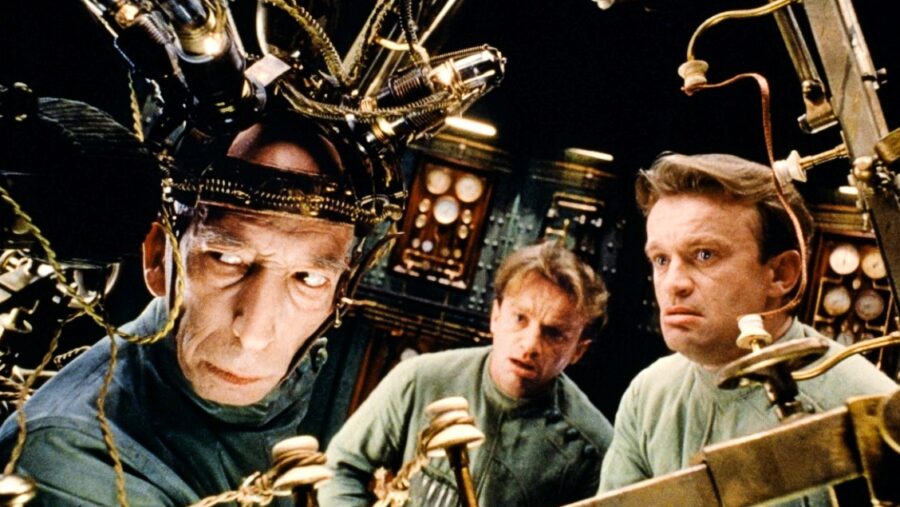The Dark Sci-Fi Fantasy Unlike Anything You’ve Ever Seen, Stream Without Netflix Immediately

Sci-fi is a vast genre, one populated with an abundance of masterpieces and stinkers alike. But few dare to traverse the dreamlike and nightmarish landscapes adorning The City of Lost Children. Directed by the visionary duo of Marc Caro and Jean-Pierre Juenet, the 1995 icon of surreal sci-fi cinema blends the grotesque with the gorgeous–not unlike the films of Guillermo Del Toro. Moreover, the movie sports a narrative as engaging as it is visually breathtaking.
Ron Perlman Stars In The City Of Lost Children

Caro and Juenet’s film, an international co-production involving France, Germany, and Spain, benefits from their unique stylistic handiwork, which also charmed audiences in their other films, Amelie and Delicatessen.
A very young Ron Perlman leads the cast of The City of Lost Children, which relates the dark saga of Krank, a misbegotten creation of a disappeared scientist. In a plot piece so characteristic of the film, Krank lacks the ability to dream. Dreamless, Krank ages prematurely.
Krank’s desperate, dark solution? Kidnap the children of a nearby port city and steal their dreams—all with the help of a terrifying machine. A sinister cyborg cult, fittingly dubbed the Cyclops, assists Krank in abducting children; the antagonist compensates the cult by mechanically enhancing their senses.
Krank’s Stronghold

This is where Hellboy himself, Ron Perlman, comes in. Perlman plays One, a carnival strongman whose own adopted baby brother, Denrée, becomes one of Krank’s victims in the macabre crime at the heart of The City of Lost Children. Catapulted by personal loss, One launches a quest to rescue his sibling, joining forces with Miette (played by the excellent Judith Vittet), a resourceful orphan girl.
The pair venture bravely through the labyrinth of danger and deceit permeating Krank’s stronghold, an abandoned oil rig. Their quest, like a darkly surreal homage to The Odyssey, means contending with a criminal underbelly managed by the Octopus, i.e., conjoined twins commanding a gang of orphans.
Disturbing perils, narrow escapes from the terrifying Cyclops, betrayals, and unexpected alliances enrich One and Miette’s adventure—one enhanced by horror elements in addition to the sci-fi weirdness so central to The City of Lost Children.
The Perfect Blending Of Genres

To exemplify the synthesis of sci-fi, horror, and surreality, consider Irvin, an ally of One and Miette and, incidentally, also a brain in a vat who wages his own rebellion against Krank. Or take Marcello, a circus performer whose superpower is controlling trained fleas, fleas inducing violent aggression in others—an ability proving crucial at several important junctures in the film.
Perhaps the film’s most memorable sequence occurs when Miette must wield the dream-extracting machine herself, launching a psychological contest with Krank, a duel located in the dream realm itself.
A Visually Stunning Film Praised By Critics

Those who saw The City of Lost Children in the mid-’90s, or those lucky enough to relish it for the first time today, will enjoy how much Angelo Badalamenti’s haunting musical score enhances the project. The same can be said for the incredible costumes designed by none other than Jean-Paul Gaultier.
Along with the cinematography, direction, and original screenplay, the score and costume design embark audiences on a journey to a realm where reality and fantasy blur together. For its unmistakable style, arresting plot, and signature fusion of dreamlike fantasy and nearly-noir sci-fi horror, the film earned a coveted spot in the 1995 Cannes Film Festival.
Critics enjoyed the movie, which currently boasts an 80 percent approval rating on Rotten Tomatoes, derived from 59 reviews; for comparison, on Metacritic, the film achieved a score of 73. Experts considered The City of Lost Children a captivating and occasionally disturbing work of art, reveling in various intriguing concepts while rooting audiences to their seats.
Still, some reviewers criticized the film for leaving some of its fascinating narrative concepts unresolved. In other words, the movie gets a little high on its own supply.
Stream The City Of Lost Children On Tubi

On the financial side, the film could have been more successful. It raised seven million dollars in France, a million dollars in Spain, and only $600,000 in Germany; it also, unfortunately, made less than two million dollars in North America. With a global gross of $11 million and a budget of $18 million, the film would go down in history as, yes, a box-office bomb.
But that doesn’t make it any less artistically excellent. Stream The City of Lost Children today.












